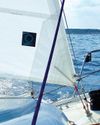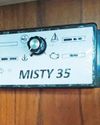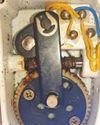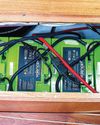يحاول ذهب - حر
Five top causes of engine failure and how to prevent them
Summer 2024
|Practical Boat Owner
Jake Kavanagh talks to Sea Start marine engineer Nick Eales about how to avoid the five major causes of an engine breakdown at sea

A modern marine diesel engine won't let you down you'll let it down. These words from a time-served marine engineer tend to get to the root of the most common breakdowns, especially when underway - little preventative maintenance, poor quality fuel, or the absence of spares (or knowledge) to help fix the problem in situ.
With a few notable exceptions, such as Bukh and Yanmar, marine diesel engines are almost entirely based on commercial or automotive blocks that have been marinised. This introduces some extra complexity, usually by using seawater as a coolant and fuel that can sit for long periods in the tank between outings.
The environment the engine lives in is also working against it. Salty air, lack of use and changes in temperature can age your engine prematurely. 'Standing' faults from dormancy can also be an issue. Research has shown that an average offshore motorboat engine only runs for around 50 hours a year, with a sailing yacht's engine clocking even less. A truck engine would do that in a fortnight.
 However, while automotive engines are packed tightly under a bonnet and have more electronics than Apollo 9, boat engines are usually easier to access and fix. The marinisation process is also very robust, with the service items often sensibly placed. Twin engine installations are sometimes 'handed' so dipsticks and filters can all be reached from the central walkway.
However, while automotive engines are packed tightly under a bonnet and have more electronics than Apollo 9, boat engines are usually easier to access and fix. The marinisation process is also very robust, with the service items often sensibly placed. Twin engine installations are sometimes 'handed' so dipsticks and filters can all be reached from the central walkway.هذه القصة من طبعة Summer 2024 من Practical Boat Owner.
اشترك في Magzter GOLD للوصول إلى آلاف القصص المتميزة المنسقة، وأكثر من 9000 مجلة وصحيفة.
هل أنت مشترك بالفعل؟ تسجيل الدخول
المزيد من القصص من Practical Boat Owner

Practical Boat Owner
An adventure to St Kilda
Marsali Taylor swaps skippering her Offshore 8m for being crew on a converted herring drifter, with comfy berths in the former fish hold
8 mins
January 2026

Practical Boat Owner
Mast refit and upgrade
Nicholas Koligiannis explains how he improved the mast on his Albin Ballad
5 mins
January 2026

Practical Boat Owner
Making more noise in fog
Nick Tyler takes the guesswork out of broadcasting fog signals
3 mins
January 2026

Practical Boat Owner
Solo across the Pacific
Triple amputee Craig Wood sailed into the history books with a non-stop, 90-day, 7,506-mile unassisted voyage
8 mins
January 2026
Practical Boat Owner
Al-assisted Shipping Forecasts
The Met Office has released new data showing a decade of steady improvement in the UK Shipping Forecast, with wind speed and sea state accuracy up by 10% or more.
1 min
January 2026

Practical Boat Owner
Bligh-ted reputation
Making the case for the mutiny on the Bounty's much maligned Captain Bligh
3 mins
January 2026

Practical Boat Owner
Wiper motor repair
Richard Stone mends his deck saloon windscreen wipers
2 mins
January 2026

Practical Boat Owner
'Let someone know boat plans' says report into fatal man overboard incident
The importance of designating a shore contact before setting off on a boat trip has been highlighted following a fatal man overboard incident near Inishbofin, Co. Galway, Ireland.
1 mins
January 2026

Practical Boat Owner
LITHIUM BATTERIES latest safety advice
Marine engineer and surveyor Marcus Jones unpicks the confusion surrounding the use of lithium batteries and what you should consider if installing them on board your boat
8 mins
January 2026

Practical Boat Owner
How to winterise your motor boat
Jon Mendez explains the steps you need to take to ensure your boat stays in top condition for next season
4 mins
January 2026
Listen
Translate
Change font size
